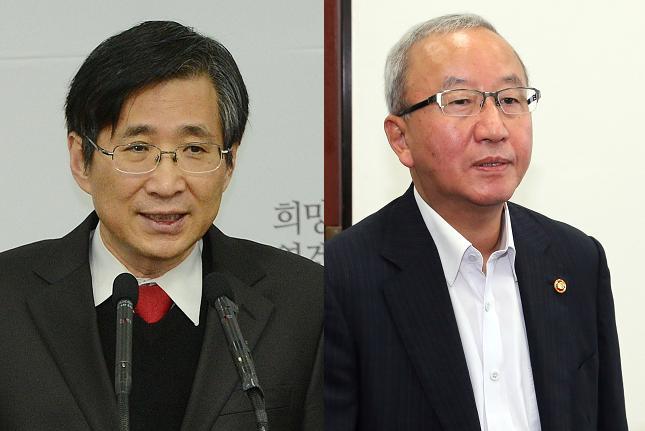 |
Senior presidential economic adviser Cho Won-dong (left) and Deputy Prime Minister and Finance Minister Hyun Oh-seok (Yonhap News) |
Political strife and public criticism escalated on Monday over the latest tax code revision proposal, with calls mounting for Deputy Prime Minister and Finance Minister Hyun Oh-seok and senior presidential economic adviser Cho Won-dong to take “full responsibility” for the revision.
Backlash has built up since last week, and President Park Geun-hye ordered her senior advisers and policymakers to redraw the administration’s tax revision from scratch so that it would benefit low- and middle-income families.
“This (revision) goes totally against the government’s initial economic policy that was intended to support the mid- and low-income groups, not to make their wallets thinner,” said Park in a meeting with her advisors on Monday.
Political circles, civic organizations and professional accountants have locked horns over whether the government’s revised tax proposal is fair and manageable for the middle class.
Some experts said the government should have admitted to raising taxes on mid- and top income earners with a new tax levying system, rather than promoting the reduction of tax exemptions.
Although the administration was heading in the right direction with its revision to secure tax revenue for welfare expenses, it might have made a “strategic” mistake with its methods of drawing an income line that differentiates between the low and mid-to-top brackets at 34.5 million won ($31,000), industry sources said.
Replacing tax deductions with tax credits in which government-designated spending such as child education, medical treatment and pension would no longer be separated from an individual’s annual income for deductions became a huge burden, especially on the middle class.
Pundits claimed that the government has dropped a “tax bombshell” on households with an income level of more than 34.5 million won, which fall into the top 28 percent group, accounting for more than 4 million workers.
The Ministry of Finance has been trying to put out the fire since the introduction of the revision last week, explaining that taxes would rise “very little” for workers with an annual income of more than 34.5 million won.
It said, for instance, a worker with an annual income of 70 million won would see a tax increase of up to only 160,000 won a year.
The Finance Ministry said more taxes from high-income earners and conglomerates, and normalizing the underground economy, would enable the government to collect about 50 trillion won for the 135 trillion won welfare budget.
By Park Hyong-ki (
hkp@heraldcorp.com)








